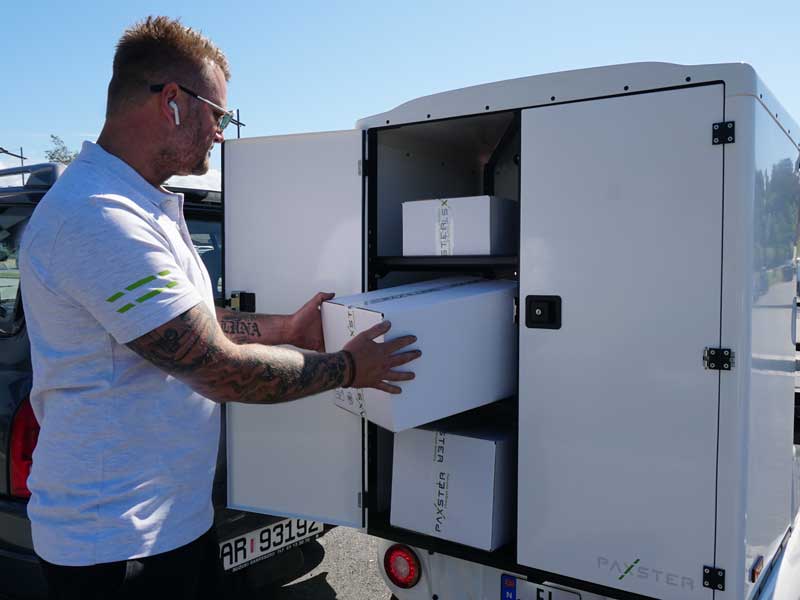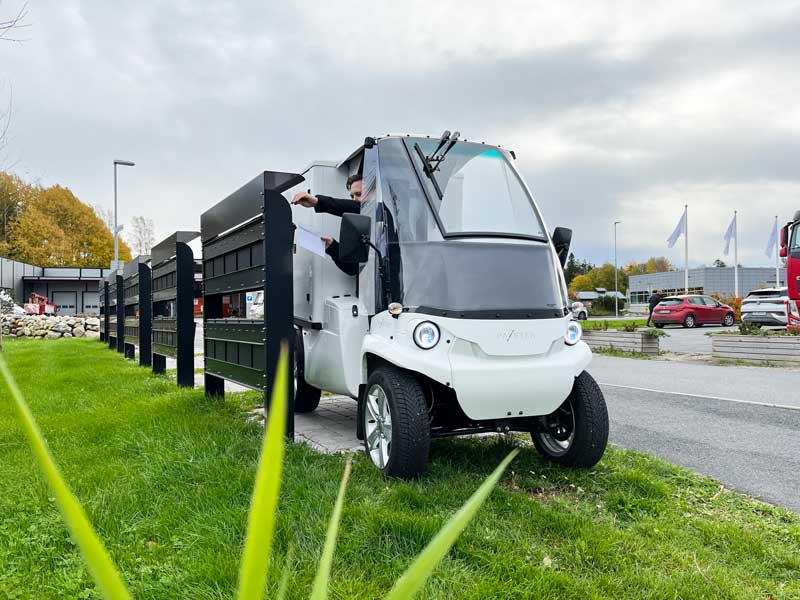BIG NEWS - Royal Mail scales up with Paxster electric delivery vehicles
For fleets
Why ergonomics matter in last-mile delivery
26. April 2023
Spending hours getting in and out of a vehicle, handling deliveries, and navigating busy streets takes a toll on the body. In this article, we explore why ergonomics are essential for last-mile drivers – and speak with a physiotherapist to understand how better vehicle design can help prevent strain and injury.

The correct lifting height is crucial when performing hundreds of lifts a day.
Better ergonomics, healthier workers
Øyvind Henriksveen, Physiotherapist at NEMUS explains: “Ergonomics is important for all occupational groups. Postal workers are particularly vulnerable due to the repetitive nature of the tasks they perform and the amount of time spent in one position, which gives the body little opportunity for relief. It is not always easy to recognize the body’s signals when it is telling you that it’s time to stretch. As a postal worker, you need to keep mobile to avoid long-term injury due to being in the same position and doing the same movements throughout the day.”

Øyvind Henriksveen, Phyiotherapist at NEMUS
About to choose a new vehicle for your last-mile? You should ensure:
- the access for loading and unloading is smooth and easy (between 24″ and 62″ above the standing surface)
- products are close – within 16″ from the driver
- that there’s no climbing, bending, or stretching for the driver during delivery
- the driver can easily jump in and out of the vehicle to save time and protect their health
- the driver has optimal sitting comfort and adjustable seats
Ergonomic benefits of an open vehicle
According to Henriksveen, open vehicles help reduce strain on joints, muscles, and soft tissues caused by repetitive movements and static postures—common risk factors for long-term injury. “You can’t rest your arm on the window frame in an open vehicle, which might feel comfortable short-term, but over time it can lead to neck and shoulder issues,” he explains.

An open vehicle lets you deliver directly from the seat – far less straining than getting in and out of a car hundreds of times a day.
How switching to an open vehicle can reduce sick leave
Posten Norge reduced sick leave by 15% when they switched to an open vehicle for their last-mile distribution. We asked the physiotherapist how that could happen: “Open vehicles reduce the likelihood of remaining in stationary positions for long and at the same time reduce many repetitive movements such as opening and closing the door. They allow you to work in a position where the body is strong, such as standing to lift packages and letters in front of them. Adjustable seats and sitting right back in the seat reduces unnecessary tension in the muscles and tissue to prevent pain in the lower back, neck, and shoulders.”
“This is why I love my open vehicle”
May-Britt Christiansen drives her Paxster every day to deliver post and parcels to residents. “The Paxster is the best vehicle we have ever had in Posten Norge”, she says. “It’s great for the cold Norwegian winter, easy to navigate, even in winter conditions and I love the heated handgrips.” May-Britt loves the fact that she can easily jump in and out and of the vehicle.
“I love that I can store post and parcels in the front”
May-Britt Christiansen, Paxster-driver

May-Britt Christiansen loves her open vehicle!
Ergonomics and the employee experience first
When developing the Paxster, we worked closely with Posten Norge (Norway Post) to create a solution that puts ergonomics and the employee experience first. The vehicle is designed around the user’s needs – allowing drivers to reach most mailboxes without leaving the seat. Where that’s not possible, narrow and retractable footrests make dismounting easier. A high seating position also reduces the physical strain of getting in and out repeatedly during the workday. Since introducing open vehicles like Paxster, Posten Norge has reported reductions in both sick leave and delivery times.
4 ergonomic tips for last-mile delivery workers:
- Sit well on the seat, with a relaxed neck and arms resting, with your thumbs facing outwards.
- Try to sit with your hips firmly in the seat.
- If you need to lift, bend your legs and aim to get your knees over your toes. Try to keep your back straight and get your body behind what you are going to lift.
- Remember to stretch lightly throughout the workday, you do not have to perform this many times to get the benefits.